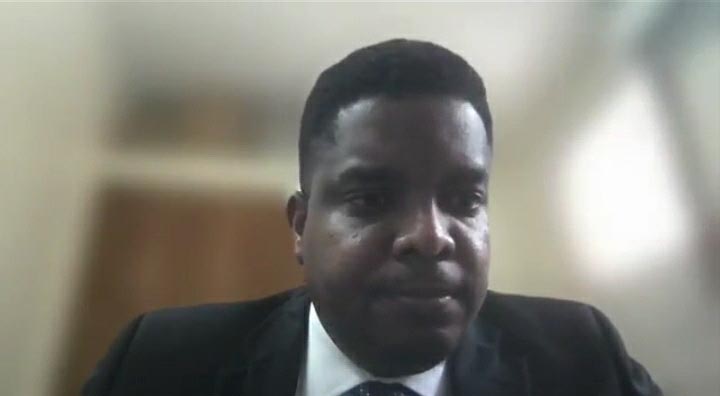The attorney for the trade unions challenging the government’s COVID-19 vaccination policy was yesterday unsuccessful in a bid to secure the temporary suspension of the measures restricting access to public spaces by unvaccinated persons.
Attorney Darren Wade’s request was made before High Court Judge Fidela Corbin-Lincoln, who is hearing an application for injunctive relief against the State by three of the trade unions that represent workers in the public service.
Specifically referencing what he described as the hardship faced by many who are being locked out of their places of employment and places of worship, and face risk of arrest for breach of the measures, Wade asked for Attorney General Anil Nandlall to give an undertaking for the measures to be lifted, at least until after the injunction proceedings would have been heard.

Nandlall, however, said that that would not be possible at the present time.
The AG, who is the respondent in the action, described the undertaking sought by Wade as an “onerous” one “on the thin shoulders of the AG, which I cannot give at this time.”
The application filed by the Guyana Teachers’ Union (GTU), the Guyana Public Service Union (GPSU) and umbrella body the Guyana Trades Union Congress (GTUC), predates the most recent COVID measures that Wade was seeking to have lifted.
Contending that then President David Granger exceeded his authority when he issued the first COVID-19 emergency measure in March, 2020, the unions are now calling for the measures to be quashed. They have also asked the Court to grant an injunction preventing the State from implementing the requirement that government workers show proof of vaccination against COVID-19 or produce a recent negative PCR test result at their own expense. They have asked that the court order the government to stand the cost for regular COVID-19 testing of public servants.
When the matter was called yesterday morning, Nandlall, in his address on the preliminary issue, said that the Court does not have the power to grant injunctive relief against the State as was being sought by the trade unions.
He said in accordance with the State Liability and Proceedings Act (SL&PA), injunctions cannot be granted against the State to prohibit it from taking an action or to mandate it to perform an action.
He pointed to Section 16(6) of the Act, which states, “Where in any proceedings against the state any relief is sought as might in proceedings between citizens be granted by way of injunction or specific performance, the court shall not grant an injunction or make an order for specific performance but may in lieu thereof make an order declaratory of the rights of the parties.”
Nandlall stressed that in accordance with the Act, it is only a declaratory order that the Court can grant against the State.
Attorney Dane Victor Elliot-Hamilton, who represents the unions in association with Wade, argued, however, that the Court does have the power to grant the injunctions sought.
Citing Sections 8 and 10 of the Judicial Review Act (JRA), Elliot-Hamilton said there is provision for the review of actions of State/public officials against whom injunctions can be granted.
Nandlall, however, drew a distinction between public bodies and the State, explaining that while indeed injunctive relief can be granted against such officials, it still cannot be granted against the State.
On this point, he said that the effect of the JRA was that it took an equitable remedy and carved from it a remedy to review the exercise of power by public officials. The fundamental distinction, the AG said, is that the drafters of that Act were careful not to injunct the acts of the State, which he said were separate from those of public officials.
He then pointed out that under the very JRA, the relief to be sought against the State would have to be through the grant of a conservatory order.
Section 8(2) of the Act sates that “the Court may, having regard to the scope of the remedies in subsection (1), grant in addition or alternatively- (a) a declaratory judgment or an advisory declaration or a prospective declaration; (b) an injunction; (c) a conservatory order, in the case of the State; (d) restitution or damages in money; or (e) an order for the return of property, immovable or movable.”
Meanwhile, Section 10 of the Act states that “an interlocutory application may be made in any application for judicial review, and the Court may make any interlocutory order, including an order for discovery of documents, for interrogatories and for cross-examination, and may grant any interim relief, including an interim injunction, interim conservatory order, and an interim declaration, as the Court thinks fit.”
Justice Corbin-Lincoln has ordered both sides to lay over written submissions on the issue to be presented when the case is called on September 17, at which time fixture for the substantive Fixed Date Application (FDA) is also going to be announced.
The applicants want the COVID-19 emergency measures requiring proof of vaccination or a negative test to be provided by public servants before they can access their work-place be declared unconstitutional.
The action was instigated after unvaccinated public servants, including front-line healthcare workers, were denied access to the Georgetown Public Hospital Corporation (GPHC) and other healthcare facilities.
Minister of Health Dr. Frank Anthony has told reporters that these workers will be marked absent and not paid for those days they were locked out of the hospitals. The Ministry of Education has also announced that all teachers will be required to provide proof of vaccination or a weekly negative PCR test before being allowed into the classroom.






